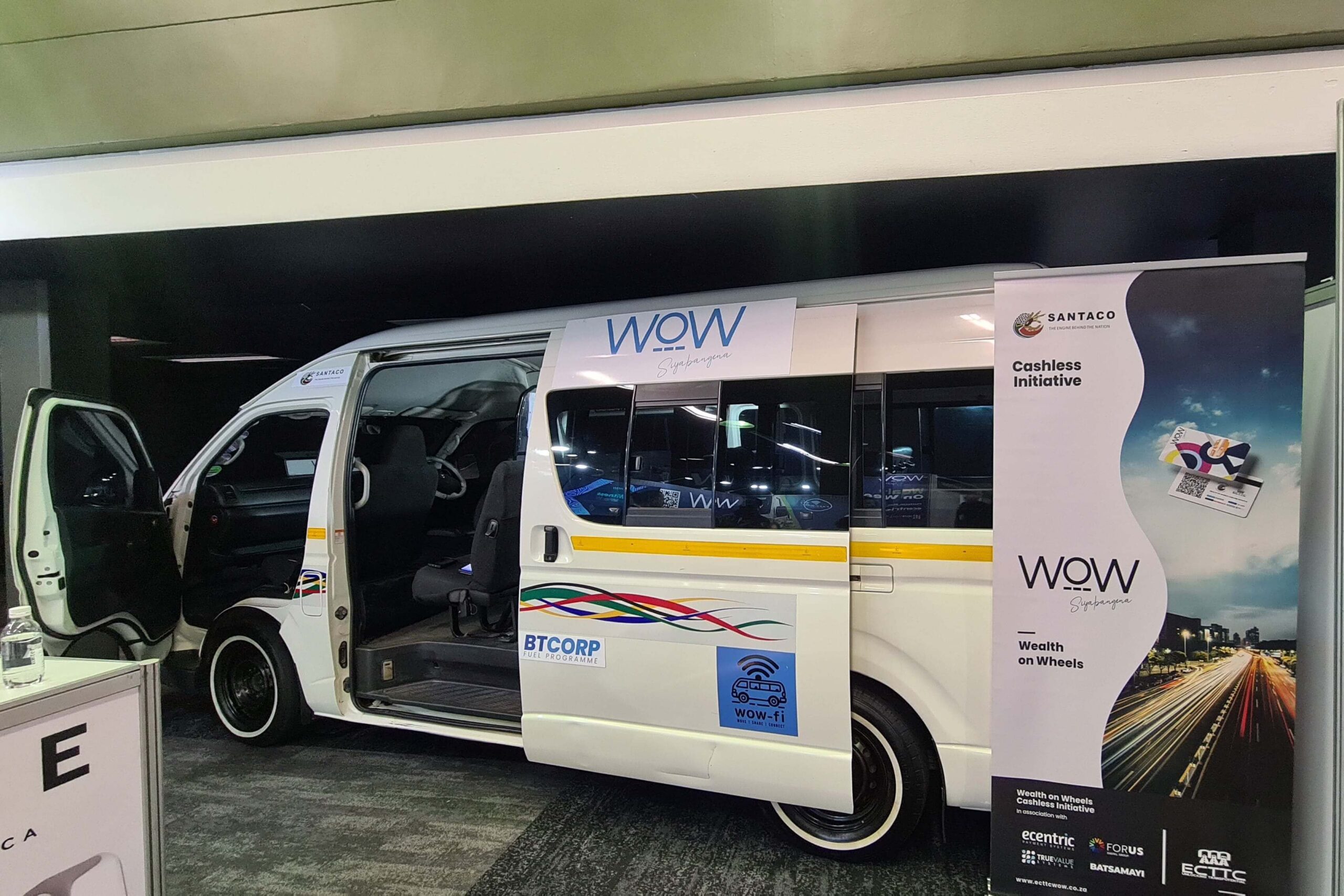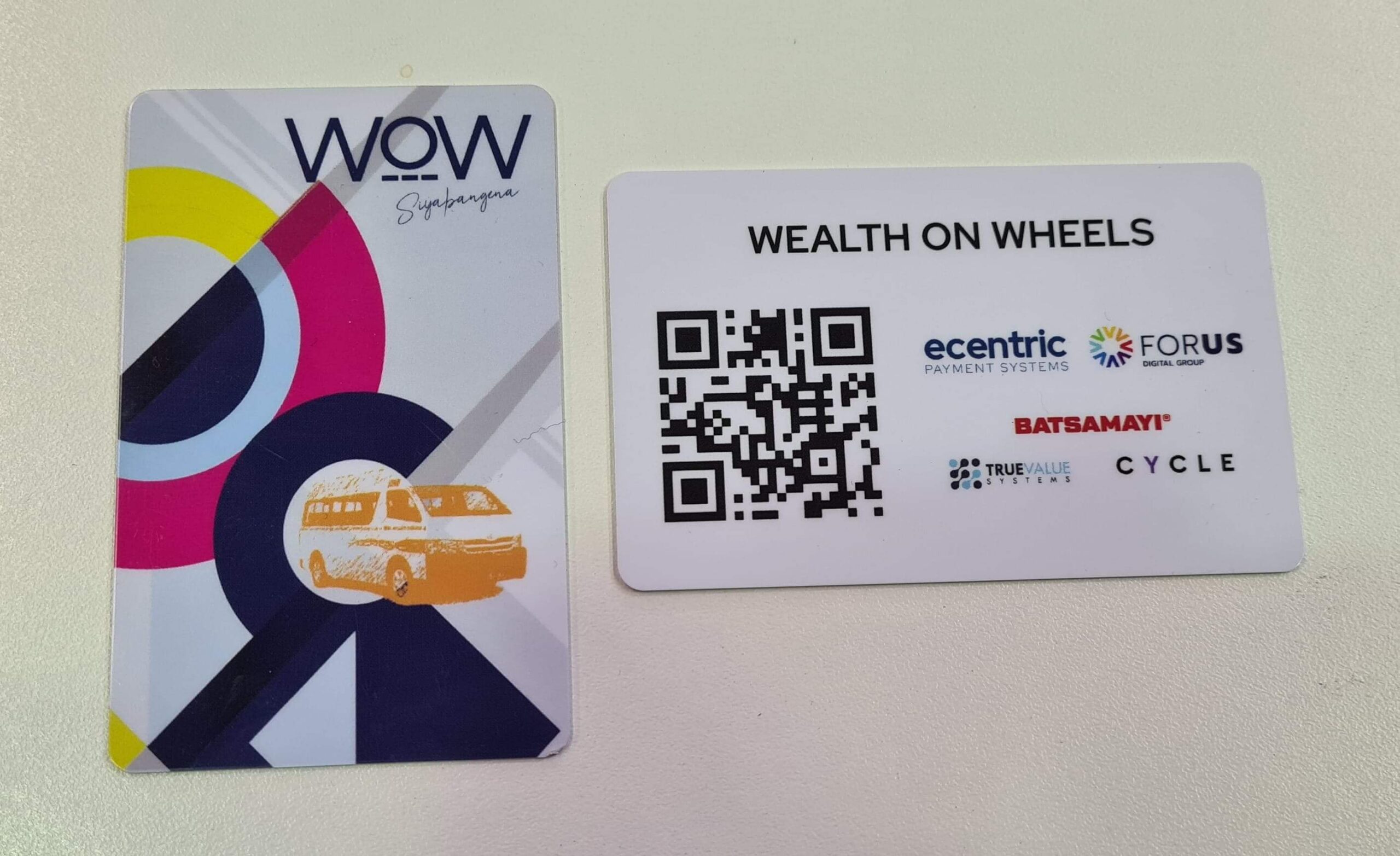The Wealth On Wheels (WOW) initiative was launched at the recent Southern African National Transport Conference (SATC) in Pretoria. This initiative, led by the Eastern Cape Transport Tertiary Cooperative Limited (ECTTC) – the business arm of the South African National Taxi Council (SANTACO), in partnership with Ecentric Payment Systems and FORUS Digital, aims to revolutionise the local minibus taxi industry. The initiative seeks to use innovative technologies such as digital cash payments and blockchain to help minibus owners enhance operations and maximise their revenue, while creating a safer and more secure environment for the travelling public. The WOW platform will introduce digital cash payments, advanced fleet and vehicle management systems with GPS, camera monitoring, fuel rebates, and a modernised scholar transport system.

The Initiative’s exhibition at the 42nd annual Southern African National Transport Conference, which took place between 8 and 11 July, included two taxis serving as technology demonstrators, and was awarded the best exhibition stand that “WOWed the conference”. The innovations on display as well as the award were a first for a solution emerging from within the taxi industry.
“It has been a journey of over a year with the WOW team, but it has been a longer journey for Ecentric, as we started about five years ago with assessing the industry’s needs. To see the culmination of the journey at this conference is a wonderful achievement, and we are excited about it. A lot of work has been done to ensure alignment between all aspects of this project, including people, process, technology, legal and financial. This is by no means the end, and there is still a lot of hard work to be done – but it is legacy defining,” says Hassen Sheik, CEO of Ecentric Payment Systems.
End-to-end digital ecosystem
The WOW Initiative will go into production with ~1 000 regular minibus taxis in the Eastern Cape province, being fitted with necessary equipment, including GPS trackers, cameras, Wi-Fi access points and devices needed to accept digital cash payments. Other taxis will be implemented with a similar solution, for use as scholar transport; the only difference being children using wristbands (with their guardian information stored on them), rather than needing cards. The objective is to onboard the taxis of the Eastern Cape. Two further launch projects for digital cash and fuel rebates are earmarked for launch in the Western Cape.
Sheik explains that WOW is not just a payments solution, but an end-to-end ecosystem digitisation journey that helps formalise the minibus taxi industry while ensuring the safety of drivers, commuters and the public. In addition, taxi operators will be able to monetise the captive audience within their vehicles by offering value added services, such as selling airtime or prepaid electricity, or allowing people to pay their bills without having to go to a retail store. Taxis within the Initiative may also be equipped with “WOW-Fi”, which offers commuters free Wi-Fi while earning additional revenue for operators through displaying advertisements.

“The WOW Initiative has taken a bottom-up approach. We have engaged industry first in order to understand their pain points and to look at how the private sector can help tackle those challenges. Through this process of collaboration, we have come up with this ecosystem that talks to what they need. The technology is a by-product – the key is that it is solving a problem for industry,” says Sheik.
For taxi owners, WOW offers continuous GPS tracking giving them real-time information on how and where their taxis are being used, how many passengers are being carried, and how much the vehicle is earning. The intention is to empower the owners by using data and transparency to make informed decisions, such as identifying which are the most profitable routes and at which times.
Ultimately, having this data – recorded on immutable blockchain ledgers – enables taxi commuters to potentially benefit from government rebates in the future, as well as fuel savings for owners. Three cameras in the vehicles enhance safety on the road whilst optionally alerting owners of incidents (speeding, drowsiness, cell phone usage etc…) via an App.
Paul Wenborn, Business Development and Mobility lead at Ecentric, highlights that WOW is a collaboration between the taxi industry and various private sector partners including Ecentric (payments & program management), FORUS (distributed ledger technology, platform architecture and financial model), BATSAMAYI (platform apps), True Value Systems (GPS tracking, comms and other hardware) and CYCLE Payments Africa (Point of Sale for informal merchants).
“The WOW platform meets the needs of all stakeholders, including Merchants, Assistants, Drivers, Owners, TOCs, Associations, and local, provincial, and national government, with a special focus on delighting Commuters.”

Industry-driven technology solution
Dr Nokuthula Mbebe, CEO of ECTTC, echoed Sheik’s sentiments by adding that there can be no development of the local minibus taxi industry without the participation of industry stakeholders itself. “The taxi industry knows best when it comes to the requirements and challenges that need to be met, and needs to be in charge of finding a solution. There is a positive attitude toward this initiative as it is owned by the taxi industry and there is a willingness to make it work. Participants at the conference were pleasantly surprised to learn how a big technology initiative with tremendous benefits for South Africa and beyond can be driven by the taxi industry,” she says.
She adds that ECTTC has conducted numerous roadshows across the Eastern Cape in order to ‘test the waters’ and that the response has been positive, while there is also growing interest from other provinces. Beyond the initial rollout in Gqeberha and Lusikisiki , the organisation aims to implement the WOW Initiative in five other districts in the province: OR Tambo, Joe Gqabi, Alfred Nzo, Chris Hani and Amathole.
Mbebe explains that minibus taxi operators are welcoming the solution as it brings transparency to their operations, where in the past they were entirely reliant on the driver to record how much revenue was being earned. Taxi drivers also stand to benefit from the WOW initiative; where previously their jobs were unsecure, the formalisation of the taxi industry will see them having employment contracts and being graded and paid accordingly. On the other hand, customers are also happy as continuous camera monitoring inside the taxis create a safe and secure environment for commuters and scholars.
“We are in the Fourth Industrial Revolution where everything is being digitised, and as such we as the industry needed a solution that would be safe and secure, while introducing cashless payments. However, you cannot have a cashless system without formalisation of the minibus taxi industry first,” concludes Mbebe.

